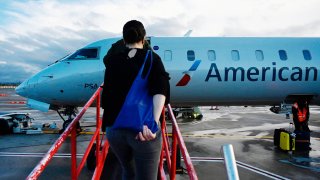
- The FDA said it is asking states to pause the use of J&J’s Covid-19 vaccine after six women in the U.S. developed a rare blood clotting disorder.
- Airline and other travel stocks that had rallied as more people were vaccinated fell after the announcement.
- Airlines are counting on vaccinations and a decline in cases to help further spur summer bookings.
Airline and other travel stocks fell Tuesday after U.S. authorities called for a pause in the use of Johnson & Johnson's Covid-19 vaccine due to rare reports of blood clotting.
The Food and Drug Administration asked states to halt use of the single-dose vaccine after six people in the U.S. developed a rare blood clotting disorder after receiving the shot. J&J said "no clear causal relationship" has been identified between the blood clots and the vaccine and said it is working with regulators to assess the issue.
The recommendation comes just as airlines and other travel companies have reported improvement in bookings after coronavirus cases fell from the peak earlier this year and more people are vaccinated.
Get South Florida local news, weather forecasts and entertainment stories to your inbox. Sign up for NBC South Florida newsletters.
Shares of Delta Air Lines were down more than 2%, while United Airlines was off less than 1% in late morning trading. American Airlines shares were down more than 2%. The Fort Worth, Texas-based carrier on Tuesday estimated its first-quarter revenue was 62% lower than during the first quarter of 2019.
American said expects to post a net loss of $2.7 billion to $2.8 billion for the quarter, excluding federal payroll aid for the sector. The airline said its daily cash burn in the quarter averaged about $27 million a day, including $9 million a day in debt and severance payments, below the $30 million it previously estimated.
Cruise operators Carnival and Norwegian Cruise Line were each down less than 1%, while Marriott was off more than 1% and Hilton fell less than 1%. The S&P 500 was up 0.1% in late morning trading.




